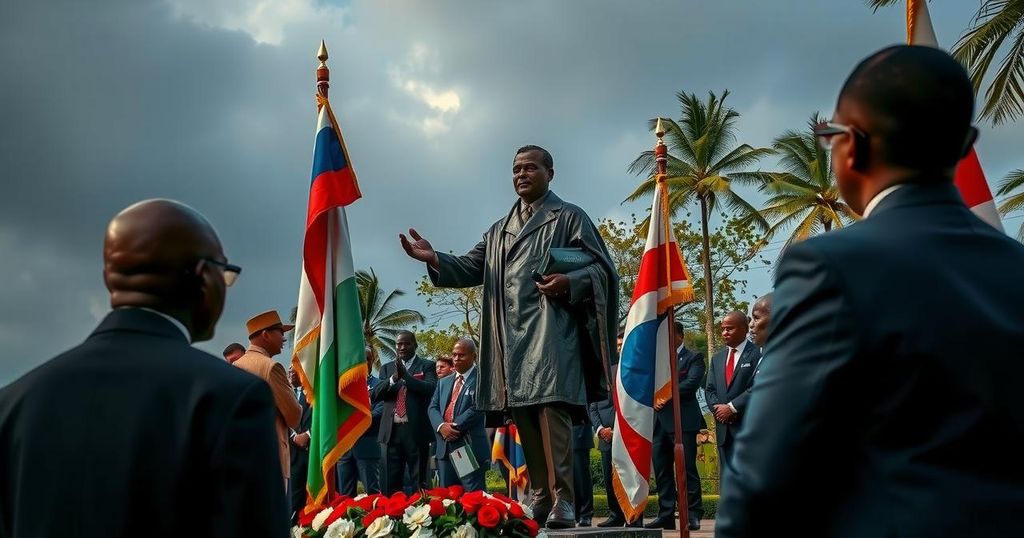Central African Republic Commemorates Yevgeny Prigozhin with Statue Unveiling

A statue honoring Yevgeny Prigozhin, founder of Russia’s Wagner Group, was recently unveiled in the Central African Republic (CAR). This monument symbolizes the enduring partnership between CAR and Russian mercenaries, who have been involved in local military efforts since 2018. Despite Prigozhin’s death, the Wagner Group continues to operate in the region, raising concerns regarding resource exploitation amid ongoing political instability.
In the Central African Republic (CAR), a statue commemorating Yevgeny Prigozhin, the late founder of Russia’s Wagner Group, has been unveiled in the capital, Bangui. This monument, which also features Prigozhin’s associate, Dmitru Utkin, illustrates both men in military attire, reflecting their roles within the mercenary organization. The establishment of this statue symbolizes the close ties between CAR and Russia, as Wagner has been actively involved in assisting the CAR government since 2018, particularly in combating rebel factions and managing natural resource contracts. Despite Prigozhin’s demise in a plane crash in August 2023, the Wagner Group, now operating under the name Corps Africa, continues its significant presence in the region, bolstering the local government amid ongoing political instability. President Touadéra has publicly supported Wagner’s operations, claiming that cooperation has substantially improved security in a nation previously besieged by conflict. Critics argue, however, that these mercenaries exploit the country’s abundant natural resources, amid a backdrop of continued unrest and poverty. This latest statue adds to a narrative already highlighted by a separate monument in Bangui depicting Russian troops providing protection to civilians.
The unveiling of the statue in honor of Yevgeny Prigozhin occurs in a context where the Wagner Group has played a pivotal role in the Central African Republic since its establishment in the past decade. Initially emerging from engagement in Ukraine, the group’s footprint in Africa has expanded significantly, particularly in CAR where it has been integrated into national security efforts at the behest of the local government. Notably, the relationship stems from requests by CAR’s President Faustin-Archange Touadéra to counteract severe threats from various armed groups, reflecting a complex interplay of military assistance and resource exploitation. Despite the official government narrative asserting improvements in security, the ramifications of such foreign involvement engender ongoing debates about sovereignty and the ethical implications of mercenary activity.
In conclusion, the unveiling of the statue of Yevgeny Prigozhin in the Central African Republic marks a significant acknowledgment of the Wagner Group’s influence in the region. This event underscores not only the military collaboration between CAR and Russia but also raises critical questions regarding the exploitation of natural resources and the broader implications for national sovereignty. As the region continues to grapple with its turbulent history, the presence of foreign mercenaries remains a contentious issue, with the potential to exacerbate existing challenges.
Original Source: www.bbc.com








